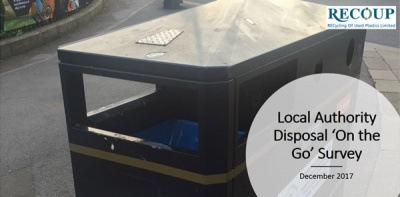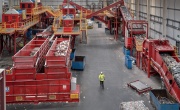Tightening budgets preventing councils from delivering ‘On the Go’ recycling collections
The ability of local authorities to provide adequate ‘On the Go’ recycling facilities is being restricted by tightening budgets and significant costs, according to a report by RECOUP.
The disposal of used packaging away from the household in public spaces such as parks and high streets is a strategic challenge for local authorities and one that is gaining increasing attention, with potential solutions such as a bottle deposit return scheme (DRS) among those currently being discussed.
 RECOUP, a charity that works with stakeholders from the plastics industry to promote recycling, surveyed nearly 100 local authorities across England, Wales, Scotland and Northern Ireland to gain an insight into the opportunities and challenges posed by ‘On the Go’ provision and collection to councils.
RECOUP, a charity that works with stakeholders from the plastics industry to promote recycling, surveyed nearly 100 local authorities across England, Wales, Scotland and Northern Ireland to gain an insight into the opportunities and challenges posed by ‘On the Go’ provision and collection to councils.
The report found that 42 per cent of local authorities provide ‘On the Go’ collection units for both litter and recycling in public spaces, although data on collection quantities and levels of litter and street sweeping are minimal.
Regarding the end destination of material collected for recycling from ‘on the Go’ disposal infrastructure, 82 per cent of local authorities reported that material collected for recycling was sent to a materials recycling facility (MRF), with the remaining 18 per cent sending it to a mixture of ‘dirty’ MRFs (where materials are recovered from the residual waste stream), incineration and landfill.
Numerous barriers to a wider implementation of ‘On the Go’ collections were identified by local authorities. RECOUP’s report divides these into three categories:
-
Contamination - Much of the waste collected for recycling from ‘On the Go’ disposal locations has high levels of contamination, particularly that which is collected from tourist areas, sea front locations, near fast food outlets and city and town centres, with fly tipping a problem also.
-
Budget for communications and education - It has been reported that ‘On the Go’ collections require a multi-channel approach to maximise collection performance, making use of multiple communications and marketing channels to encourage participation, acting as a ‘nudge’ to improved behaviour. However, there is little to no budget for local authorities to deliver this.
-
Procurement, maintenance and collection costs - There are significant costs associated with emptying the collection units, procuring and installing bins and the maintenance of such bins. Local authorities report that these costs often prove prohibitive and outweigh the potential benefits of more ‘On the Go’ collections, although it has also been reported that the right placement of bins in areas with high footfall or a littering problem can prove effective. Some local authorities stated that to make ‘On the Go’ recycling effective, ways to recover recyclables from contaminated loads were necessary.
Funding is undoubtedly an obstructive barrier to delivering more ‘On the Go’ recycling services, with 22 per cent of local authorities saying that they would use additional funding solely to deliver communications and education, 15 per cent would increase their recycling bin provisions, and eight per cent would use the funding for scheme maintenance costs. 48 per cent, meanwhile, said that they would use the funds across the full range of measures.
Commenting on the report, RECOUP Technical Manager Steve Morgan stated: “We are increasingly seeing the priority placed to ‘On the Go’ services to reduce litter and also provide services for the public to recycle away from home. This survey shows the scale of the challenges that Local Authorities are facing to provide effective collection services.”
Steve Brunt, Joint Assistant Director of Streetscene at Bolsover & North East Derbyshire District Councils added: “We found that the operational difficulties outweigh any potential benefits to ‘On the Go’ collections we would have gained through contribution to our combined recycling rate. The cost versus benefit needs to be proven. We have concentrated on increasing performance in our kerbside dry recycling and organic waste collections.”
The report is available to download on the RECOUP website. 





